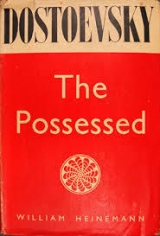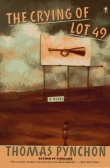
Текст книги "The Possessed"
Автор книги: Федор Достоевский
сообщить о нарушении
Текущая страница: 17 (всего у книги 49 страниц)
“Is that you?” he asked suddenly.
“Yes,” replied the uninvited guest.
Shatov slammed the window, went downstairs and opened the gate. Nikolay Vsyevolodovitch stepped over the high sill, and without a word passed by him straight into Kjrillov's lodge.
There everything was unlocked and all the doors stood open.
The passage and the first two rooms were dark, but there was a light shining in the last, in which Kirillov lived and drank tea, and laughter and strange cries came from it. Nikolay Vsyevolodovitch went towards the light, but stood still in the doorway without going in. There was tea on the table. In the middle of the room stood the old woman who was a relation of the landlord. She was bareheaded and was dressed in a petticoat and a hare-skin jacket, and her stockingless feet were thrust into slippers. In her arms she had an eighteen-months-old baby, with nothing on but its little shirt; with bare legs, flushed cheeks, and ruffled white hair. It had only just been taken out of the cradle. It seemed to have just been crying; there were still tears in its eyes. But at that instant it was stretching out its little arms, clapping its hands, and laughing with a sob as little children do. Kirillov was bouncing a big red india-rubber ball on the floor before it. The ball bounced up to the ceiling, and .jack to the floor, the baby shrieked “Baw! baw!” Kirillov caught the “baw '.' and gave it to it. The baby threw it itself with its awkward little hand's, and Kirillov ran to pick it up again.
At last the “baw” rolled under the cupboard. “Baw! baw!” cried the child. Kirillov lay down on the floor, trying to reach the ball with his hand under the cupboard. Nikolay Vsyevolodovitch went into the room. The baby caught sight of him, nestled against the old woman, and went off into a prolonged infantile wail. The woman immediately carried it out of the room.
“Stavrogin?” said Kirillov, beginning to get up from the floor with the ball in his hand, and showing no surprise at the unexpected visit. “Will you have tea?”
He rose to his feet.
“I should be very glad of it, if it's hot,” said Nikolay Vsyevolodovitch; “I'm wet through.”
“It's hot, nearly boiling in fact,” Kirillov declared delighted. “Sit down. You're muddy, but that's nothing; I'll mop up the floor later.”
Nikolay Vsyevolodovitch sat down and emptied the cup he handed him almost at a gulp.
“Some more?” asked Kirillov.
“No, thank you.”
Kirillov, who had not sat down till then, seated himself facing him, and inquired:
“Why have you come?”
“On business. Here, read this letter from Gaganov; do you remember, I talked to you about him in Petersburg.”
Kirillov took the letter, read it, laid it on the table and looked at him expectantly.
“As you know, I met this Gaganov for the first time in my life a month ago, in Petersburg,” Nikolay Vsyevolodovitch began to explain. “We came across each other two or three times in company with other people. Without making my acquaintance and without addressing me, he managed to be very insolent to me. I told you so at the time; but now for something you don't know. As he was leaving Petersburg before I did, he sent me a letter, not like this one, yet impertinent in the highest degree, and what was queer about it was that it contained no sort of explanation of why it was written. I answered him at once, also by letter, and said, quite frankly, that he was probably angry with me on account of the incident with his father four years ago in the club here, and that I for my part was prepared to make him every possible apology, seeing that my action was unintentional and was the result of illness. I begged him to consider and accept my apologies. He went away without answering, and now here I find him in a regular fury. Several things he has said about me in public have been repeated to me, absolutely abusive, and making astounding charges against me. Finally, to-day, I get this letter, a letter such as no one has ever had before, I should think, containing such expressions as 'the punch you got in your ugly face.' I came in the hope that you would not refuse to be my second.”
“You said no one has ever had such a letter,” observed Kirillov, “they may be sent in a rage. Such letters have been written more than once. Pushkin wrote to Hekern. All right, I'll come. Tell me how.”
Nikolay Vsyevolodovitch explained that he wanted it to be to-morrow, and that he must begin by renewing his offers of apology, and even with the promise of another letter of apology, but on condition that Gaganov, on his side, should promise to send no more letters. The letter he had received he would regard as unwritten.
“Too much concession; he won't agree,” said Kirillov.
“I've come first of all to find out whether you would consent to be the bearer of such terms.”
“I'll take them. It's your affair. But he won't agree.”
“I know he won't agree.”
“He wants to fight. Say how you'll fight.”
“The point is that I want the thing settled to-morrow. By nine o'clock in the morning you must be at his house. He'll listen, and won't agree, but will put you in communication with his second – let us say about eleven. You will arrange things with him, and let us all be on the spot by one or two o'clock. Please try to arrange that. The weapons, of course, will be pistols. And I particularly beg you to arrange to fix the barriers at ten paces apart; then you put each of us ten paces from the barrier, and at a given signal we approach. Each must go right up to his barrier, but you may fire before, on the way. I believe that's all.”
“Ten paces between the barriers is very near,” observed Kirillov.
“Well, twelve then, but not more. You understand that he wants to fight in earnest. Do you know how to load a pistol?”
“I do. I've got pistols. I'll give my word that you've never fired them. His second will give his word about his. There'll be two pairs of pistols, and we'll toss up, his or ours?”
“Excellent.”
“Would you like to look at the pistols?”
“Very well.”
Kirillov squatted on his heels before the trunk in the corner, which he had never yet unpacked, though things had been pulled out of it as required. He pulled out from the bottom a palm-wood box lined with red velvet, and from it took out a pair of smart and very expensive pistols.
“I've got everything, powder, bullets, cartridges. I've a revolver besides, wait.”
He stooped down to the trunk again and took out a six-chambered American revolver.
“You've got weapons enough, and very good ones.”
“Very, extremely.”
Kirillov, who was poor, almost destitute, though he never noticed his poverty, was evidently proud of showing precious weapons, which he had certainly obtained with great sacrifice.
“You still have the same intentions?” Stavrogin asked after a moment's silence, and with a certain wariness.
“Yes,” answered Kirillov shortly, guessing at once from his voice what he was asking about, and he began taking the weapons from the table.
“When?” Nikolay Vsyevolodovitch inquired still more cautiously, after a pause.
In the meantime Kjrillov had put both the boxes back in his trunk, and sat down in his place again.
“That doesn't depend on me, as you know – when they tell me,” he muttered, as. though disliking the question; but at the same time with evident readiness to answer any other question. He kept his black, lustreless eyes fixed continually on Stavrogin with a calm but warm and kindly expression in them.
“I understand shooting oneself, of course,” Nikolay Vsyevolodovitch began suddenly, frowning a little, after a dreamy silence that lasted three minutes. “I sometimes have thought of it myself, and then there always came a new idea: if one did something wicked, or, worse still, something shameful, that is, disgraceful, only very shameful and . . . ridiculous, such as people would remember for a thousand years and hold in scorn for a thousand years, and suddenly the thought comes: 'one blow in the temple and there would be nothing more.' One wouldn't care then for men and that they would hold one in scorn for a thousand years, would one?”
“You call that a new idea?” said Kirillov, after a moment's thought.
“I ... didn't call it so, but when I thought it I felt it as a new idea.”
“You 'felt the idea'?” observed Kirillov. “That's good. There are lots of ideas that are always there and yet suddenly become new. That's true. I see a great deal now as though it were for the first time.”
“Suppose you had lived in the moon,” Stavrogin interrupted, not listening, but pursuing his own thought, “and suppose there you had done all these nasty and ridiculous things. . . . You know from here for certain that they will laugh at you and hold you in scorn for a thousand years as long as the moon lasts. But now you are here, and looking at the moon from here. You don't care here for anything you've done there, and that the people there will hold you in scorn for a thousand years, do you?”
“I don't know,” answered Kirillov. “I've not been in the moon,” he added, without any irony, simply to state the fact.
“Whose baby was that just now?”
“The old woman's mother-in-law was here – no, daughter-in-law, it's all the same. Three days. She's lying ill with the baby, it cries a lot at night, it's the stomach. The mother sleeps, but the old woman picks it up; I play ball with it. The ball's from Hamburg. I bought it in Hamburg to throw it and catch it, it strengthens the spine. It's a girl.”
“Are you fond of children?”
“I am,” answered Kirillov, though rather indifferently.
“Then you're fond of life?”
“Yes, I'm fond of life! What of it?”
“Though you've made up your mind to shoot yourself.”
“What of it? Why connect it? Life's one thing and that's another. Life exists, but death doesn't at all.”
“You've begun to believe in a future eternal life?”
“No, not in a future eternal life, but in eternal life here. There are moments, you reach moments, and time suddenly stands still, and it will become eternal.”
“You hope to reach such a moment?”
“Yes.”
“That'll scarcely be possible in our time,” Nikolay Vsyevolodovitch responded slowly and, as it were, dreamily; the two spoke without the slightest irony. “In the Apocalypse the angel swears that there will be no more time.”
“I know. That's very true; distinct and exact. When all mankind attains happiness then there will be no more time, for there'll be no need of it, a very true thought.”
“Where will they put it?”
“Nowhere. Time's not an object but an idea. It will be extinguished in the mind.”
“The old commonplaces of philosophy, the same from the beginning of time,” Stavrogin muttered with a kind of disdainful compassion.
“Always the same, always the same, from the beginning of time and never any other,” Kirillov said with sparkling eyes, as though there were almost a triumph in that idea.
“You seem to be very happy, Kirillov.”
“Yes, very happy,” he answered, as though making the most ordinary reply.
“But you were distressed so lately, angry with Liputin.”
“H'm . . . I'm not scolding now. I didn't know then that I was happy. Have you seen a leaf, a leaf from a tree?”
“Yes.”
“I saw a yellow one lately, a little green. It was decayed at the edges. It was blown by the wind. When I was ten years old I used to shut my eyes in the winter on purpose and fancy a green leaf, bright, with veins on it, and the sun shining. I used to open my eyes and not believe them, because it was very nice, and I used to shut them again.”
“What's that? An allegory?”
“N-no . . . why? I'm not speaking of an allegory, but of a leaf, only a leaf. The leaf is good. Everything's good.”
“Everything?”
“Everything. Man is unhappy because he doesn't know he's happy. It's only that. That's all, that's all! If anyone finds out he'll become happy at once, that minute. That mother-in-law will die; but the baby will remain. It's all good. I discovered it all of a sudden.”
“And if anyone dies of hunger, and if anyone insults and outrages the little girl, is that good?”
“Yes! And if anyone blows his brains out for the baby, that's good too. And if anyone doesn't, that's good too. It's all good, all. It's good for all those who know that it's all good. If they knew that it was good for them, it would be good for them, but as long as they don't know it's good for them, it will be bad for them. That's the whole idea, the whole of it.”
“When did you find out you were so happy?”
“Last week, on Tuesday, no, Wednesday, for it was Wednesday by that time, in the night.”
“By what reasoning?”
“I don't remember; I was walking about the room; never mind. I stopped my clock. It was thirty-seven minutes past two.”
“As an emblem of the fact that there will be no more time !”
Kirillov was silent.
“They're bad because they don't know they're good. When they find out, they won't outrage a little girl. They'll find out that they're good and they'll all become good, every one of them.”
“Here you've found it out, so have you become good then?”
“I am good.”
“That I agree with, though,” Stavrogin muttered, frowning.
“He who teaches that all are good will end the world.”
“He who taught it was crucified.”
“He will come, and his name will be the man-god.”
“The god-man?”
“The man-god. That's the difference.”
“Surely it wasn't you lighted the lamp under the ikon?”
“Yes, it was I lighted it.”
“Did you do it believing?”
“The old woman likes to have the lamp and she hadn't time to do it to-day,” muttered Kirillov.
“You don't say prayers yourself?”
“I pray to everything. You see the spider crawling on the wall, I look at it and thank it for crawling.”
His eyes glowed again. He kept looking straight at Stavrogin with firm and unflinching expression. Stavrogin frowned and watched him disdainfully, but there was no mockery in his eyes.
“I'll bet that when I come next time you'll be believing in
God too,” he said, getting up and taking his hat.
“Why?” said Kirillov, getting up too.
“If you were to find out that you believe in God, then you'd believe in Him; but since you don't know that you believe in Him, then you don't believe in Him,” laughed Nikolay Vsyevolodovitch.
“That's not right,” Kirillov pondered, “you've distorted the idea. It's a flippant joke. Remember what you have meant in my life, Stavrogin.”
“Good-bye, Kirillov.”
“Come at night; when will you?”
“Why, haven't you forgotten about to-morrow?”
“Ach, I'd forgotten. Don't be uneasy. I won't oversleep. At nine o'clock. I know how to wake up when I want to. I go to bed saying 'seven o'clock,' and I wake up at seven o'clock, 'ten o'clock,' and I wake up at ten o'clock.”
“You have remarkable powers,” said Nikolay Vsyevolodovitch, looking at his pale face.
“I'll come and open the gate.”
“Don't trouble, Shatov will open it for me.”
“Ah, Shatov. Very well, good-bye.”
VI
The door of the empty house in which Shatov was lodging was not closed; but, making his way into the passage, Stavrogin found himself in utter darkness, and began feeling with his hand for the stairs to the upper story. Suddenly a door opened upstairs and a light appeared. Shatov did not come out himself, but simply opened his door. When Nikolay Vsyevolodovitch was standing in the doorway of the room, he saw Shatov standing at the table in the corner, waiting expectantly.
“Will you receive me on business?” he queried from the doorway.
“Come in and sit down,” answered Shatov. “Shut the door; stay, I'll shut it.”
He locked the door, returned to the table, and sat down, facing Nikolay Vsyevolodovitch. He had grown thinner during that week, and now he seemed in a fever.
“You've been worrying me to death,” he said, looking down, in a soft half-whisper. “Why didn't you come?”
“You were so sure I should come then?”
“Yes, stay, I have been delirious . . . perhaps I'm delirious now. . . . Stay a moment.”
He got up and seized something that was lying on the uppermost of his three bookshelves. It was a revolver.
“One night, in delirium, I fancied that you were corning to kill me, and early next morning I spent my last farthing on buying a revolver from that good-for-nothing fellow Lyamshin; I did not mean to let you do it. Then I came to myself again . . . I've neither powder nor shot; it has been lying there on the shelf till now; wait a minute. ...”
He got up and was opening the casement.
“Don't throw it away, why should you?” Nikolay Vsyevolodovitch checked him. “It's worth something. Besides, tomorrow people will begin saying that there are revolvers lying about under Shatov's window. Put it back, that's right; sit down. Tell me, why do you seem to be penitent for having thought I should come to kill you? I have not come now to be reconciled, but to talk of something necessary. Enlighten me to begin with. You didn't give me that blow because of my connection with your wife?”
“You know I didn't, yourself,” said Shatov, looking down again.
“And not because you believed the stupid gossip about Darya Pavlovna?”
“No, no, of course not! It's nonsense! My sister told me from the very first ...” Shatov said, harshly and impatiently, and even with a slight stamp of his foot.
“Then I guessed right and you too guessed right,” Nikolay Vsyevolodovitch went on in a tranquil voice. “You are right. Marya Timofyevna Lebyadkin is my lawful wife, married to me four and a half years ago in Petersburg. I suppose the blow was on her account?”
Shatov, utterly astounded, listened in silence.
“I guessed, but did not believe it,” he muttered at last, looking strangely at Stavrogin.
“And you struck me?”
Shatov flushed and muttered almost incoherently:
“Because of your fall . . . your lie. I didn't go up to you to punish you ... I didn't know when I went up to you that I should strike you ... I did it because you meant so much to me in my life ... I ...”
“I understand, I understand, spare your words. I am sorry you are feverish. I've come about a most urgent matter.”
“I have been expecting you too long.” Shatov seemed to be quivering all over, and he got up from his seat. “Say what you have to say ... I'll speak too . . . later.”
He sat down.
“What I have come about is nothing of that kind,” began Nikolay Vsyevolodovitch, scrutinising him with curiosity. “Owing to certain circumstances I was forced this very day to choose such an hour to come and tell you that they may murder you.”
Shatov looked wildly at him.
“I know that I may be in some danger,” he said in measured tones, “but how can you have come to know of it?”
“Because I belong to them as you do, and am a member of their society, just as you are.”
“You . . . you are a member of the society?”
“I see from your eyes that you were prepared for anything from me rather than that,” said Nikolay Vsyevolodovitch, with a faint smile. “But, excuse me, you knew then that there would be an attempt on your life?”
“Nothing of the sort. And I don't think so now, in spite of your words, though . . . though there's no being sure of anything with these fools!” he cried suddenly in a fury, striking the table with his fist. “I'm not afraid of them! I've broken with them. That fellow's run here four times to tell me it was possible . . . but”– he looked at Stavrogin —“ what do you know about it, exactly?”
“Don't be uneasy; I am not deceiving you,” Nikolay Vsyevolodovitch went on, rather coldly, with the air of a man who is only fulfilling a duty. “You question me as to what I know. I know that you entered that society abroad, two years ago, at the time of the old organisation, just before you went to America, and I believe, just after our last conversation, about which you wrote so much to me in your letter from America. By the way, I must apologise for not having answered you by letter, but confined myself to ...”
“To sending the money; wait a bit,” Shatov interrupted, hurriedly pulling out a drawer in the table and taking from under some papers a rainbow-coloured note. “Here, take it, the hundred roubles you sent me; but for you I should have perished out there. I should have been a long time paying it back if it had not been for your mother. She made me a present of that note nine months ago, because I was so badly off after my illness. But, go on, please. . . .”
He was breathless.
“In America you changed your views, and when you came back you wanted to resign. They gave you no answer, but charged you to take over a printing press here in Russia from some one, and to keep it till you handed it over to some one who would come from them for it. I don't know the details exactly, but I fancy that's the position in outline. You undertook it in the hope, or on the condition, that it would be the last task they would require of you, and that then they would release you altogether. Whether that is so or not, I learnt it, not from them, but quite by chance. But now for what I fancy you don't know; these gentry have no intention of parting with you.”
“That's absurd!” cried Shatov. “I've told them honestly that I've cut myself off from them in everything. That is my right, the right to freedom of conscience and of thought. ... I won't put up with it! There's no power which could . . .”
“I say, don't shout,” Nikolay Vsyevolodovitch said earnestly, checking him. “That Verhovensky is such a fellow that he may be listening to us now in your passage, perhaps, with his own ears or some one else's. Even that drunkard, Lebyadkin, was probably bound to keep an eye on you, and you on him, too, I dare say? You'd better tell me, has Verhovensky accepted your arguments now, or not?”
“He has. He has said that it can be done and that I have the right. . . .”
“Well then, he's deceiving you. I know that even Kirillov, who scarcely belongs to them at all, has given them information about you. And they have lots of agents, even people who don't know that they're serving the society. They've always kept a watch on you. One of the things Pyotr Verhovensky came here for was to settle your business once for all, and he is fully authorised to do so, that is at the first good opportunity, to get rid of you, as a man who knows too much and might give them away. I repeat that this is certain, and allow me to add that they are, for some reason, convinced that you are a spy, and that if you haven't informed against them yet, you will. Is that true?”
Shatov made a wry face at hearing such a question asked in such a matter-of fact tone.
“If I were a spy, whom could I inform?” he said angrily, not giving a direct answer. “No, leave me alone, let me go to the devil!” he cried suddenly, catching again at his original idea, which agitated him violently. Apparently it affected him more deeply than the news of his own danger. “You, you, Stavrogin, how could you mix yourself up with such shameful, stupid, second-hand absurdity? You a member of the society? What an exploit for Stavrogin!” he cried suddenly, in despair.
He clasped his hands, as though nothing could be a bitterer and more inconsolable grief to him than such a discovery.
“Excuse me,” said Nikolay Vsyevolodovitch, extremely surprised, “but you seem to look upon me as a sort of sun, and on yourself as an insect in comparison. I noticed that even from your letter in America.”
“You . . . you know. . . . Oh, let us drop me altogether,” Shatov broke off suddenly, “and if you can explain anything about yourself explain it. ... Answer my question!” he repeated feverishly.
“With pleasure. You ask how I could get into such a den? After what I have told you, I'm bound to be frank with you to some extent on the subject. You see, strictly speaking, I don't belong to the society at all, and I never have belonged to it, and I've much more right than you to leave them, because I never joined them. In fact, from the very beginning I told them that I was not one of them, and that if I've happened to help them it has simply been by accident as a man of leisure. I took some part in reorganising the society, on the new plan, but that was all. But now they've changed their views, and have made up their minds that it would be dangerous to let me go, and I believe I'm sentenced to death too.”
“Oh, they do nothing but sentence to death, and all by means of sealed documents, signed by three men and a half. And you think they've any power!”
“You're partly right there and partly not,” Stavrogin answered with the same indifference, almost listlessness. “There's no doubt that there's a great deal that's fanciful about it, as there always is in such cases: a handful magnifies its size and significance. To my thinking, if you will have it, the only one is Pyotr Verhovensky, and it's simply good-nature on his part to consider himself only an agent of the society. But the fundamental idea is no stupider than others of the sort. They are connected with the Internationale.They have succeeded in establishing agents in Russia, they have even hit on a rather original method, though it's only theoretical, of course. As for their intentions here, the movements of our Russian organisation are something so obscure and almost always unexpected that really they might try anything among us. Note that Verhovensky is an obstinate man.”
“He's a bug, an ignoramus, a buffoon, who understands nothing in Russia!” cried Shatov spitefully.
“You know him very little. It's quite true that none of them understand much about Russia, but not much less than you and I do. Besides, Verhovensky is an enthusiast.”
“Verhovensky an enthusiast?”
“Oh, yes. There is a point when he ceases to be a buffoon and becomes a madman. I beg you to remember your own expression: 'Do you know how powerful a single man may be?' Please don't laugh about it, he's quite capable of pulling a trigger. They are convinced that I am a spy too. As they don't know how to do things themselves, they're awfully fond of accusing people of being spies.”
“But you're not afraid, are you?”
“N– no. I'm not very much afraid. . . . But your case is quite different. I warned you that you might anyway keep it in mind. To my thinking there's no reason to be offended in being threatened with danger by fools; their brains don't affect the question. They've raised their hand against better men than you or me. It's a quarter past eleven, though.” He looked at his watch and got up from his chair. “I wanted to ask you one quite irrelevant question.”
“For God's sake!” cried Shatov, rising impulsively from his seat.
“I beg your pardon?” Nikolay Vsyevolodovitch looked at him inquiringly.
“Ask it, ask your question for God's sake,” Shatov repeated in indescribable excitement, “but on condition that I ask you a question too. I beseech you to allow me ... I can't . . . ask your question!”
Stavrogin waited a moment and then began. “I've heard that you have some influence on Marya Timofyevna, and that she was fond of seeing you and hearing you talk. Is that so?”
“Yes . . . she used to listen . . .” said Shatov, confused. “Within a day or two I intend to make a public announcement of our marriage here in the town.”
“Is that possible?” Shatov whispered, almost with horror.
“I don't quite understand you. There's no sort of difficulty about it, witnesses to the marriage are here. Everything took place in Petersburg, perfectly legally and smoothly, and if it has not been made known till now, it is simply because the witnesses, Kirillov, Pyotr Verhovensky, and Lebyadkin (whom I now have the pleasure of claiming as a brother-in-law) promised to hold their tongues.”
“I don't mean that . . . You speak so calmly . . . but good! Listen! You weren't forced into that marriage, were you?”
“No, no one forced me into it.” Nikolay Vsyevolodovitch smiled at Shatov's importunate haste.
“And what's that talk she keeps up about her baby?” Shatov interposed disconnectedly, with feverish haste.
“She talks about her baby? Bah! I didn't know. It's the first time I've heard of it. She never had a baby and couldn't have had: Marya Timofyevna is a virgin.”
“Ah! That's just what I thought! Listen!”
“What's the matter with you, Shatov?”
Shatov hid his face in his hands, turned away, but suddenly clutched Stavrogin by the shoulders.
“Do you know why, do you know why, anyway,” he shouted, “why you did all this, and why you are resolved on such a punishment now!”
“Your question is clever and malignant, but I mean to surprise you too; I fancy I do know why I got married then, and why I am resolved on such a punishment now, as you express it.”
“Let's leave that ... of that later. Put it off. Let's talk of the chief thing, the chief thing. I've been waiting two years for you.”
“Yes?”
“I've waited too long for you. I've been thinking of you incessantly. You are the only man who could move ... I wrote to you about it from America.”
“I remember your long letter very well.”
“Too long to be read? No doubt; six sheets of notepaper. Don't speak! Don't speak! Tell me, can you spare me another ten minutes? . . . But now, this minute ... I have waited for you too long.”
“Certainly, half an hour if you like, but not more, if that will suit you.”
“And on condition, too,” Shatov put in wrathfully, “that you take a different tone. Do you hear? I demand when I ought to entreat. Do you understand what it means to demand when one ought to entreat?”
“I understand that in that way you lift yourself above all ordinary considerations for the sake of loftier aims,” said Nikolay Vsyevolodovitch with a faint smile. “I see with regret, too, that you're feverish.”
“I beg you to treat me with respect, I insist on it!” shouted Shatov, “not my personality – I don't care a hang for that, but something else, just for this once. While I am talking ... we are two beings, and have come together in infinity . . . for the last time in the world. Drop your tone, and speak like a human being! Speak, if only for once in your life with the voice of a man. I say it not for my sake but for yours. Do you understand that you ought to forgive me that blow in the face if only because I gave you the opportunity of realising your immense power. . . . Again you smile your disdainful, worldly smile! Oh, when will you understand me! Have done with being a snob! Understand that I insist on that. I insist on it, else I won't speak, I'm not going to for anything!”








